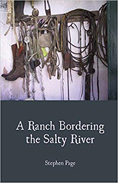
 |
now I administrate. I was
a cowboy, a deputy, a sheriff. Now
I judge."
A surreal glimpse into the inner workings of ranch life sheds light on the simplicity and beauty of oneness with nature. In this fusion of poetry and narrative, Page does a commendable job of juxtaposing the daily hustle of ranch life with the opportunity to pause and enjoy the moment. The imagery of Jonathan and his wife sipping mate, a caffeine-rich drink, as the much-needed rain patters down is a refreshing reminder to appreciate time and simply observe nature at work. Throughout the book, chaos and harmony work in tandem to create a mood that is simultaneously whimsical and idyllic.
While many of the poems are relatable to nature lovers and those immersed in ranch life, “Hen Eggs,” in particular, captures the constant tug between the wants and needs, work and rest. In this piece, readers can feel Jonathan’s desire to sleep in a little more, while the responsibilities of the home, specifically screaming children, leave him no choice but to begin his day. Conjuring the image of Jonathan watching Disney movies with his grandchildren, singing, and dancing seemingly carefree is refreshing and liberating. With every description of the weather, the “full-body polar fleece” clothing to protect against frigid cold, and Jonathan’s collie, Diego, chasing grazing horses instead of the opossums and foxes, Page is using his command of poetry to imprint mental snapshots of Jonathan’s story into the readers’ minds.
Throughout the compilation, Page’s use of simile, metaphor, and repetition helps illuminate the narrative. In “Our Dog Dominic,” the collie running across the lawn with the sun bouncing off its chest is described as “a journeying god riding a chariot.” Later, his continual use of the phrase “my no longer” helps audiences embrace just how therapeutic moving away from the incessant noise of city life has been for Jonathan. The poetry does not lose its flair for the dramatic in its pursuit of literary mastery. On the contrary, figurative devices help build the tension in Jonathan’s world, from cows “gurgling for air” and facing imminent death being saved by a horseback vet to the Tattler abusing his job privileges on the ranch to cause damage to Jonathan’s livestock.
Page’s panoramic and romanticized portrayal of Jonathan’s new, environmentally-conscious life strongly resembles the work of canvas landscape painter John Constable, whose “The Hay Wain” and “Stratford Mill” capture the same essence of nature as Page’s depiction of the flowering apricot trees, budding plum trees, and ponies walking in the yard. At the same time, Jonathan’s desire to explore the woods is distinctly reminiscent of Henry David Thoreau’s search for meaning through nature and transcendentalism. Undoubtedly, the author’s grasp of literary history and the craft of writing is on full display from the onset of the book. Though many of the poems are memorable, poems like “I was a Soldier” are likely to stay with the reader. The stark contrast between a former and present life, imbued with pacing that gives off a musical, rhythmic quality helps demonstrate the transformation of the individual. Overall, Page seamlessly weaves poetry and narrative to bring his world to life with vivid imagery, figurative language, and a heavy dose of authenticity.
RECOMMENDED by the US Review